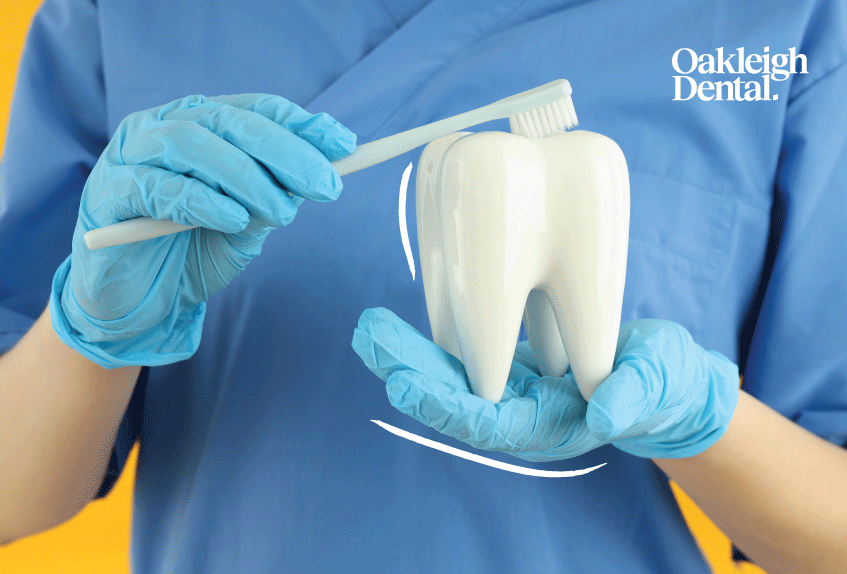It can be worrisome noticing a loose adult tooth. While it’s normal to feel it as a child, it’s quite alarming when it comes to your permanent tooth. However, if you notice the pain early enough, there’s a good chance it can be saved.
Taking action quickly, speaking to a dentist, and treating your tooth are the three most important steps you can take to help your smile.
What is a loose tooth?
A loose adult tooth is caused by a lack of support from the gum. Overtime, the tooth slowly detaches from the gum and begins to cause pain in the mouth. It’s important to find out the root of the problem by seeing a dentist, from there, they can treat it.
If left untreated, loose teeth in adults may lead to infection or teeth falling out. Some general pains to be aware of with a wobbly tooth are:
- Aching from your tooth
- A sensitivity to cold or warm food items
- Sudden pain as you eat
- Your tooth changing colour or shape
- Holes, cracks, or chips on your tooth
- Bleeding or swollen gums

Loose teeth causes
There are four primary factors that affect loose teeth: gum disease, injury, stress, and weakened jawbones.
Gum Disease
Periodontitis, also known as gum disease, is a serious gum infection that damages the soft tissue around your teeth. About 40% of people experience gum disease, and about 70% of tooth loss happens because of the condition. Without treating it, periodontitis destroys the bone that supports your teeth, which can then cause teeth to fall out.
The root of periodontitis, or gum disease, is due to poor dental hygiene habits. If you aren’t caring for your teeth by brushing twice a day and flossing on a regular basis, hardened plaque and bacteria will grow. This plaque causes the gums to pull away from your teeth and create gaps that become infected. Over time, it breaks down the bone and tissue causing your tooth to loosen.
Symptoms may be:
- Tender, painful and swollen gums
- Bleeding gums while brushing
- Gum recession
- Changes in the layout of your teeth
Periodontitis is a common inflection but can usually be prevented if caught early on. However, if you leave it untreated, it will lead to bone deterioration so if you start to notice any of the symptoms above, it’s crucial you take action in your hygiene and see a dentist.
Injury to the mouth
Falling on your face or teeth after an accident or accidentally hitting your mouth in a sports game may cause you to chip or loosen your tooth. Sometimes the root of the tooth could be more damaged than the actual tooth, so seeing a dentist right away to check it out is vital in these situations.
Stress
In moments of high stress or anxiety, some people cope by frequently clenching or grinding their teeth causing them to loosen over time. This condition is known as bruxism and can be easily avoided once people become aware of their habits.
People also grind their teeth at night without realising it, which wears their teeth down and causes jaw pain. It’s smart to chat to your dentist and get a splint or specialised mouthguard to block the grinding sensation from ruining your teeth and potentially making them fall out.
Osteoporosis
Osteoporosis is a condition that causes bones to weaken. When it happens to your jaw bones specifically, it affects the support of your teeth to your gum. When bones are less dense it causes teeth to loosen and fall out. This condition could possibly also link to increased risk of gum disease. To help treat and avoid osteoporosis, it’s important to have regular discussions with your dentist and consume lots of calcium to build strong bones when you are young. It is important to note that loss of bone density may be due to other systemic diseases and there may be more significant disease processes at work so a visit to your doctor or GP medico may also be advisable.

Can a loose tooth be saved?
If your tooth feels loose, the most important thing to do is visit your dentist as soon as you can. Once your doctor has identified the cause, there are a variety of loose teeth treatment options depending on the severity. Here’s how to fix loose teeth.
Non-surgical
Patients with loose teeth can avoid surgery if they get on top of the issue early and it is still minor. In these cases, treatment procedures include:
- Deep cleaning: The dentist cleans the bacteria around the loose tooth and removes the infection that is growing around the gumline.
- Splinting: The loose tooth is supported with a tiny, flexible splint. It’s a flat bar built of dental cement sometimes with wires that helps to prevent the tooth from moving. It may be left in place for up to two weeks or until your tissues and ligaments have fully healed.
Surgical treatments
When the issue is more severe, you will likely need to undergo some form of surgical procedure. Typically, these are the two options:
- Flap surgery: The dentist makes incisions in your gum and pulls back the gum tissue. From there, they clean out the bacteria and hardened plaque that has built up underneath the gum pockets. There’s two methods to it: scaling and root planing. Scaling removes tartar while root planing smooths the root surface and helps the gum reattach to the tooth. Gum tissue is reattached after the procedure.
- Bone grafting: Artificial or natural bone material is put around a weakened tooth root to stimulate the growth of new bone and gum tissue. It’s often done when there’s periodontal disease, which weakens the bone around affected gums. Basic cleaning isn’t always sufficient enough if bacteria has deeply affected the gums so instead, the gums are pulled away from the teeth for a deep cleaning and any gaps are filled using a bone graft. This procedure helps rebuild bone loss.
Extraction
If your tooth is too damaged and other treatments are not possible, extraction is the only choice. Extraction means your dentist removes the tooth and replaces it in one of two ways:
- Dental bridge: Crowns are placed over the teeth on either side of the missing tooth. In between, they are joined to a false tooth which creates a “bridge” between two healthy teeth, with a false tooth in the middle to replace the missing one.
- Dental implant: An artificial tooth and root that is placed directly into the jawbone.

How to prevent loose adult teeth
Regular and proactive care can help you to avoid having loose teeth. These are our best tips for adults to prevent loose teeth:
- Practise good oral hygiene by brushing teeth two times a day and flossing regularly.
- Refraining from smoking or chewing tobacco as it is one of the leading causes of gum disease and oral cancer.
- Have a professional dental cleaning every 6 months. This way you can stay on top of your oral health and uncover problems early.
- Wear a mouthguard when playing sports to protect your teeth from chipping or getting knocked out.
- Make sure you are high in calcium and vitamin D to prevent osteoporosis from happening.
- Reduce bruxism by wearing mouthguards or retainers to sleep.
Loose tooth treatment at Oakleigh Dental
The earlier you notice, the easier your treatment will be. You have a good chance of preventing tooth loss if you seek immediate attention and treatment as soon as you feel it.
If you’re looking for a place to start, Oakleigh Dental has you covered! Book a consultation with us today.

